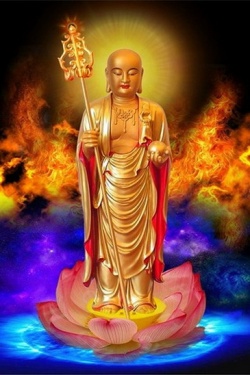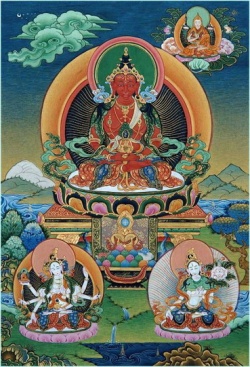Hatthaka Sutta: To Hatthaka
AN 3.34
Hatthaka Sutta: To Hatthaka
translated from the Pali by
Thanissaro Bhikkhu
On one occasion the Blessed One was staying near Alavi on a spread of leaves by a cattle track in a simsapa forest. Then Hatthaka of Alavi, out roaming & rambling for exercise, saw the Blessed One sitting on a spread of leaves by the cattle track in the simsapa forest. On seeing him, he went to him and, on arrival, having bowed down to him, sat to one side. As he was sitting there he said to the Blessed One, "Lord, I hope the Blessed One has slept in ease."
"Yes, young man. I have slept in ease. Of those in the world who sleep in ease, I am one."
"But cold, lord, is the winter night. The 'Between-the-Eights'[1] is a time of snowfall. Hard is the ground trampled by cattle hooves. Thin is the spread of leaves. Sparse are the leaves in the trees. Thin are your ochre robes. And cold blows the Verambha wind. Yet still the Blessed One says, 'Yes, young man. I have slept in ease. Of those in the world who sleep in ease, I am one.'"
"In that case, young man, I will question you in return. Answer as you see fit. Now, what do you think: Suppose a householder or householder's son has a house with a gabled roof, plastered inside & out, draft-free, with close-fitting door & windows shut against the wind. Inside he has a horse-hair couch spread with a long-fleeced coverlet, a white wool coverlet, an embroidered coverlet, a rug of kadali-deer hide, with a canopy above, & red cushions on either side. And there a lamp would be burning, and his four wives, with their many charms, would be attending to him. Would he sleep in ease, or not? Or how does this strike you?"
"Yes, lord, he would sleep in ease. Of those in the world who sleep in ease, he would be one."
"But what do you think, young man. Might there arise in that householder or householder's son any bodily fevers or fevers of mind born of passion so that — burned with those passion-born fevers — he would sleep miserably?"
"Yes, lord."
"As for those passion-born fevers — burned with which the householder or householder's son would sleep miserably — that passion has been abandoned by the Tathagata, its root destroyed, made like a palmyra stump, deprived of the conditions of development, not destined for future arising. Therefore he sleeps in ease.
"Now, what do you think, young man. Might there arise in that householder or householder's son any bodily fevers or fevers of mind born of aversion so that — burned with those aversion-born fevers — he would sleep miserably?"
"Yes, lord."
"As for those aversion-born fevers — burned with which the householder or householder's son would sleep miserably — that aversion has been abandoned by the Tathagata, its root destroyed, made like a palmyra stump, deprived of the conditions of development, not destined for future arising. Therefore he sleeps in ease.
"Now, what do you think, young man. Might there arise in that householder or householder's son any bodily fevers or fevers of mind born of delusion so that — burned with those delusion-born fevers — he would sleep miserably?"
"Yes, lord."
"As for those delusion-born fevers — burned with which the householder or householder's son would sleep miserably — that delusion has been abandoned by the Tathagata, its root destroyed, made like a palmyra stump, deprived of the conditions of development, not destined for future arising. Therefore he sleeps in ease.
- "Always, always,
- he sleeps in ease:
- the brahman totally unbound,
- who doesn't adhere
- to sensual pleasures,
- who's without acquisitions & cooled.
- Having cut all ties
- & subdued fear in the heart,
- calmed, he sleeps in ease,
- having reached peace of awareness."
Footnotes
- ↑ The "Between-the-Eights" is a period in February, regarded in northern India as the coldest part of the year.
Source
"Hatthaka Sutta: To Hatthaka" (AN 3.34), translated from the Pali by Thanissaro Bhikkhu. Access to Insight (Legacy Edition), 30 November 2013, http://www.accesstoinsight.org/tipitaka/an/an03/an03.034.than.html .



